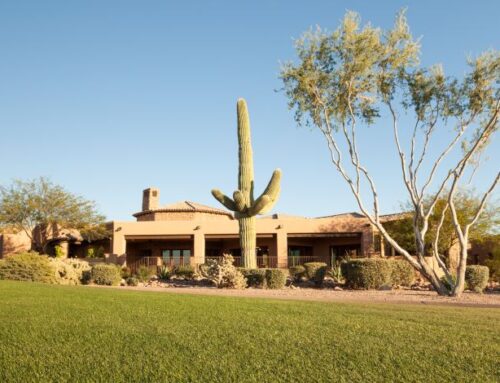Each state has specific requirements and laws when buying or selling property. While Arizona is one of eight states considered an escrow state, Arizona’s escrow process is slightly different from the other seven states.
Keep reading to find out what an escrow requirement entails and how to navigate the escrow process successfully to secure or sell your house.
What Is An Escrow State?
The majority of states require real estate attorneys to deal with property transactions. The homebuying and selling process is fairly different in Arizona, where they do not require real estate attorneys to oversee the transaction. Instead, they use an escrow agent.
So, what is escrow in real estate?
Escrow refers to a legal agreement where a third party regulates money or assets until the appropriate parties involved in the transaction meet specific terms. Essentially, the escrow agent acts as a mediator between the buyer and the seller.
During real estate transactions, escrow is designed to temporarily hold the buyer’s earnest money or a good faith deposit, which shows the degree of seriousness about purchasing the home. Additionally, escrow may hold some funds, generally the homeowner’s monthly mortgage payment, even after the purchase is complete. Those funds will automatically be used for taxes and insurance. Escrow may be controlled by an escrow company, mortgage servicer or an escrow agent (you may hear them called escrow officers as well).
As mentioned above, eight states require real estate transactions to go through the escrow process. Here is a list of escrow states:
- Arizona
- California
- Hawaii (uses the Spanish escrow system)
- Nevada
- New Mexico
- Oregon
- Texas
- Washington
How The Arizona Escrow Process Works
The escrow process starts in Arizona when the purchase contract between the buyer and seller is finalized. Once the purchase offer is accepted, the buyer’s realtor will open escrow, and the earnest money will be delivered to the escrow agent. Upon receiving the good faith deposit, the escrow agent will open the account where all the money used for the transaction will be deposited and dispersed. The agent in charge of the escrow account must adhere to the terms outlined in the purchase agreement.
Once the escrow agent opens the account, they’ll deliver opening packages to the buyer and the seller containing documents such as the seller’s loan pay-off information, request for the buyer’s contact information, identity statement and much more. The identity statement is where the buyer provides basic information that will be helpful for the escrow agent and title officer to distinguish you from others with the same name during county records search.
Subsequently, the escrow agent will order the title commitment, a document from the title insurer that discloses liens, burdens and obligations as well as defects. Additionally, the HOA demand will be sent to the seller if the property is located within a homeowners association area (HOA). The HOA demand letter is a request for any outstanding debts that need to be paid by the current homeowner before the sale can be completed. The buyer will receive pertinent information regarding HOA fees through this letter. The escrow agent will work with the buyers and the seller to ensure all requirements are met for both letters.
At this time, if the buyer is not paying in all cash, they’ll need to obtain a home loan. We recommend searching for a lender as soon as possible to avoid any delays in the closing process. Once the lender has approved the buyer for a mortgage, they’ll send instructions to the escrow agent. When the title company receives the lender’s loan documents, the escrow officer will prepare the Closing Disclosure, which contains loan terms, expected monthly payments, closing costs and additional information. According to the Consumer Financial Protection Bureau, the mortgage lender must provide the Closing Disclosure no later than three business days before the loan closing period.
Once the buyer signs the loan and escrow documents, the loan package is sent back to the lender for final review. If the lender approves everything, they’ll send the funds to the title company.
Lastly, when the title company receives the funds, the escrow agent will send the closing package to the Maricopa County Recorder’s Office. Once the documents are recorded, the buyer officially becomes the owner of the house.
How Long Does Escrow Take In Arizona?
Typically, the Arizona close of escrow timeline takes roughly 30 days from when the account is opened. In certain instances, the escrow process may take up to 60 days. The more intricate the sale, the longer the escrow process may take. However, the escrow closing date must be specified in the purchase agreement.
There are a few factors involved that may slow the process down. For example, if the buyer is not paying in all cash, the process to secure a mortgage may impede the final sale. Under most circumstances, the sale will not be derailed because the buyer is looking for a home loan, but it may extend the escrow period.
What Are The Escrow Fees In Arizona?
Ultimately, escrow fees in Arizona will depend on the title and escrow company that mediates the process. Additionally, the fees will factor in the overall value of the home being purchased. Generally, Arizona escrow fees are calculated roughly $2 for every $1,000 of the home’s purchase price. Furthermore, a fee of $250 may be added on top of that.
For example, suppose you are looking to purchase a home in the Phoenix area for $400,000. In that case, the baseline escrow fees may cost you approximately $800, not including the $250 fee and any additional fees from the title or escrow company.
Depending on the company chosen, a flat fee may be charged rather than calculating the price of the property.
Arizona Central Credit Union Can Help Finance Your Next Home
Even though the escrow process in Arizona may only take as long as two months, it may feel like a long and grueling process. Understanding the process should hopefully make things easier for you when it comes time to purchase property in Arizona.
Arizona Central Credit Union has been providing Arizonans with home loans for nearly a century. If you are looking to secure a mortgage or refinance your original mortgage, Arizona Central Credit Union makes the home loan process as simple and straightforward as possible.
We offer some of the best rates across the Grand Canyon State. Additionally, we provide a variety of home loans, including conventional mortgages, FHA home loans, VA home loans, USDA mortgages, jumbo loans and much more tailored to your needs. Contact a loan specialist today and see how we can help you secure the home of your dreams.




